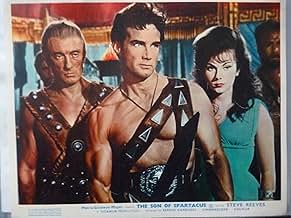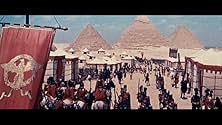Durante la spedizione in Egitto, Giulio Cesare invia in Asia minore il centurione Rando. Costui scopre di essere figlio di Spartaco, il gladiatore ribelle, e guida i ribelli conto Marco Lici... Leggi tuttoDurante la spedizione in Egitto, Giulio Cesare invia in Asia minore il centurione Rando. Costui scopre di essere figlio di Spartaco, il gladiatore ribelle, e guida i ribelli conto Marco Licinio Crasso, l'uomo che uccise suo padre.Durante la spedizione in Egitto, Giulio Cesare invia in Asia minore il centurione Rando. Costui scopre di essere figlio di Spartaco, il gladiatore ribelle, e guida i ribelli conto Marco Licinio Crasso, l'uomo che uccise suo padre.
- Regia
- Sceneggiatura
- Star
Ahmed Ramzy
- Murdok - a Lybian Chief
- (as Ahmad Ramzi)
Abdulmuniem Abdulrahman
- Slave
- (non citato nei titoli originali)
Hussein Al-Meliguy
- Slave
- (non citato nei titoli originali)
Abdel Hameed Badawy
- Slave
- (non citato nei titoli originali)
Ala Badruddin
- Rebel Slave
- (non citato nei titoli originali)
Recensioni in evidenza
10jimm-8
By 1970 Son of Spartacus (now out on DVD) found itself relegated to Saturday morning matinées, which is hardly surprising since Steve Reeves here seems to be getting twice as much combat duty as in most of the other Italian epics. So much so, one could hardly miss the kiddies re-enacting his many sword fights on the way home. Grown-ups too had something to admire, especially the eye-catching Ombretta Colli who conveniently gets shipwrecked with Reeves on a beach with her costume cut to shreds. This might prove an embarrassment to Miss Colli in later years when she went into Italian politics, no doubt hoping her voters would not remember her cheesecake days.
However, it is film music fans who have most to cheer, with a score derived from no less than three of the top Italian film composers. While Son of Spartacus was being filmed in Egypt during March and April of 1962, veteran maestro Carlo Innocenzi sadly died (on March 24). His stirring main title can still be heard in the M-G-M release, and it's an impressive full orchestral version of the slow execution march for Princess Elea in Goliath Against the Giants (1961). For the opening scenes M-G-M simply recycle Innocenzi's battle music from Goliath Against the Giants, but the opening narration is accompanied by the lovely "Glauco e Antonino" track from Lavagnino's Last Days of Pompeii (1959). For the rest of the score we get a mixture of new music by Piero Piccioni (a haunting desert tune and a rousing finale march when Reeves ultimately triumphs), plus some prior Piccioni material from Duel of the Titans (1961). The Italian language version (also available on DVD) is scored by Piccioni throughout, with a different main title adapted from "Amulio" in Duel of the Titans. Piccioni's entire score, including some unused cues, can be enjoyed on a CD thanks to those dedicated vault raiders at Digitmovies
However, it is film music fans who have most to cheer, with a score derived from no less than three of the top Italian film composers. While Son of Spartacus was being filmed in Egypt during March and April of 1962, veteran maestro Carlo Innocenzi sadly died (on March 24). His stirring main title can still be heard in the M-G-M release, and it's an impressive full orchestral version of the slow execution march for Princess Elea in Goliath Against the Giants (1961). For the opening scenes M-G-M simply recycle Innocenzi's battle music from Goliath Against the Giants, but the opening narration is accompanied by the lovely "Glauco e Antonino" track from Lavagnino's Last Days of Pompeii (1959). For the rest of the score we get a mixture of new music by Piero Piccioni (a haunting desert tune and a rousing finale march when Reeves ultimately triumphs), plus some prior Piccioni material from Duel of the Titans (1961). The Italian language version (also available on DVD) is scored by Piccioni throughout, with a different main title adapted from "Amulio" in Duel of the Titans. Piccioni's entire score, including some unused cues, can be enjoyed on a CD thanks to those dedicated vault raiders at Digitmovies
"The Slave" (aka Son of Spartacus) is a an excellent action Reeves film with a good story line to borrow from (the original Spartacus). Reeves learns of his heritage after being captured by a band of slave drivers in the Egyptian desert - also tagging along is a beautiful slave girl who along with Reeves survives being dumped overboard by a ship which hits a barge in the River. Great scene,when Reeves doubtful that he is Spartacus's son walks slowly into a small catacomb and finds the helmet and sword of Spartacus and muses for several minutes about his heritage - linking a medallion he has worn since birth with the same emblem on the sword handle of Spartacus. Also great action scene when Reeves rescues a band of prisoners of Ceasar Crassus who are tied into a large moat with water rushing in to cause a drowning execution. Excellent sword and action with several bad guys being wiped out by Steve, looking like an adonis with a metal helmet on in a great swashbuckling scene.....Reeves as a tribune of Ceasar finally realizes as did his dad, Spartacus, that the Roman empire cannot survive as a slave empire.....reluctantly Ceasar realizes it also and gives Reeves and his slave followers their freedom. Good cloak and dagger role for Steve as he poses as a tribune working for Caesar and also as the Son of Spartacus - wearing an impressive full head helmet to complete his disguise.
good
good
After the international success of HERCULES, the Steve Reeves Swords-and-Sandals vehicle THE SLAVE clearly had some money spent on its production values -- good costumes and some nice sets to accent good camera lighting abound. The plot, typical of peplum movies, is a mishmosh of themes intended to take advantage of recent hits.
Reeves is a Roman centurion working for the noble Julius Caesar in Rome. He is captured by leopard-skin wearing desert barbarians working for the evil Crassus, escapes, gets captured again, is enslaved, identified as Spartacus' son (hence the movie's Italian title) and leads a slave rebellion.
Director Sergio Corbucci does his usual highly competent job, abetted by the handsome production values that Cinecitta was capable of; kudos especially to director of Photography Enzo Baroni, whose lighting suggests illustrations on parchment. Although the writing never rises above the level of silliness that such cheap epics aspired to, fans of the genre will find plenty to enjoy.
Reeves is a Roman centurion working for the noble Julius Caesar in Rome. He is captured by leopard-skin wearing desert barbarians working for the evil Crassus, escapes, gets captured again, is enslaved, identified as Spartacus' son (hence the movie's Italian title) and leads a slave rebellion.
Director Sergio Corbucci does his usual highly competent job, abetted by the handsome production values that Cinecitta was capable of; kudos especially to director of Photography Enzo Baroni, whose lighting suggests illustrations on parchment. Although the writing never rises above the level of silliness that such cheap epics aspired to, fans of the genre will find plenty to enjoy.
Steve Reeves plays a high-ranking Roman centurion who finds out he's the son of the infamous rebel slave leader and spearheads a revolt, of course, in one of the better "sword & sandal" entries. Mixing the backstory of Moses (instead of a swaddling cloth, an amulet gives him away) with the exploits of a comic book superhero (Reeves sneaks off every now and then to shuck his tunic for dad's face-covering armor), director Corbucci took the tale and ran with it, producing some impressive mise-en-scène amidst his unexpectedly inventive camera-work. Gianna Maria Canale as Crassus' cougar wife does little more than lounge around on divans and ogle our hero but no matter, it's always a pleasure to see her in peplum like this.
This film, made at the twilight of Mr. Reeves film career, is certainly one of his best. The location work in Egypt and a rather big budget look add a great amount of, shall I say it?, realism to an essentially escapist, fantastical genre- the Italian sword and sandal flicks of the 1958-64 period. This picture also features some extremely diabolical villainy on the part of Crassus. Sir Laurence Olivier wasn't nearly this outrageously evil playing the same character in SPARTACUS! Steve's dilemma is pretty heavy in this one, doing a complete 180 from up and coming Roman centurions to advocate warrior of the freedom movement for the slaves of Rome. The action scenes stand up pretty well after 40 plus years.
Lo sapevi?
- QuizThis marked the final Italian sword and sandal/mythological muscleman movie to be made by Steve Reeves. He would make several "Sandokan" movies and a spaghetti western before retiring from the screen.
- BlooperThe story takes place during the triumvirate of Crassus, Caesar and Pompey (65-60 BC), but when Crassus talks with Verulus and Randus, with the Sphinx serving as background, it is plain that the monument has already lost its nose - a fact that would take place 1850 years later.
- Citazioni
La schiava Seila: [to Randus] My friend, my life... is you - my love!
- Versioni alternativeThe Italian theatrical version had a 101 minute running time, with minor censorship cuts for violence. The foreign versions, namely the UK (Son of Spartacus), the USA (The Slave), the German (Der Sohn des Spartakus), and the Finish, run over 102 minutes. Although unconfirmed, there are video versions in Italy and France cut to 97 or 95 minutes.
- ConnessioniFeatured in Cheezy Fantasy Trailers (2006)
I più visti
Accedi per valutare e creare un elenco di titoli salvati per ottenere consigli personalizzati
- How long is The Slave?Powered by Alexa
Dettagli
- Tempo di esecuzione
- 1h 40min(100 min)
- Proporzioni
- 2.35 : 1
Contribuisci a questa pagina
Suggerisci una modifica o aggiungi i contenuti mancanti






























